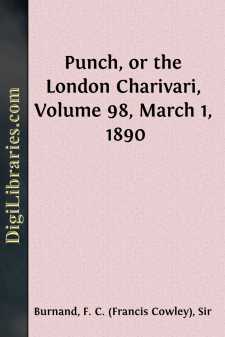Categories
- Antiques & Collectibles 13
- Architecture 36
- Art 48
- Bibles 22
- Biography & Autobiography 813
- Body, Mind & Spirit 142
- Business & Economics 28
- Children's Books 15
- Children's Fiction 12
- Computers 4
- Cooking 94
- Crafts & Hobbies 4
- Drama 346
- Education 46
- Family & Relationships 57
- Fiction 11828
- Games 19
- Gardening 17
- Health & Fitness 34
- History 1377
- House & Home 1
- Humor 147
- Juvenile Fiction 1873
- Juvenile Nonfiction 202
- Language Arts & Disciplines 88
- Law 16
- Literary Collections 686
- Literary Criticism 179
- Mathematics 13
- Medical 41
- Music 40
- Nature 179
- Non-Classifiable 1768
- Performing Arts 7
- Periodicals 1453
- Philosophy 64
- Photography 2
- Poetry 896
- Political Science 203
- Psychology 42
- Reference 154
- Religion 513
- Science 126
- Self-Help 84
- Social Science 81
- Sports & Recreation 34
- Study Aids 3
- Technology & Engineering 59
- Transportation 23
- Travel 463
- True Crime 29
Punch, or the London Charivari, Vol. 104, May 13, 1893
Categories:
Description:
Excerpt
No. X.—THE BEHRING-SEA ARBITRATION.
(Scene and Persons as usual. The Conversation has already begun.)
First Well-informed Man (concluding a tirade). —— so what I want to know is this: are we or are we not to submit to the Yankees? It's all very well talking about Chicago Exhibitions and all that, but if they're going to capture our ships and prevent us killing seals, why, the sooner we tell 'em to go to blue blazes the better. And as for its being a mare clausum——
Inquirer (interrupting). Who was she? What's she got to do with it?
First W. I. M. (laughing vigorously). Ha! ha! that's a good 'un.
Inquirer (nettled). Oh, laugh away, laugh away. That's you all over.
First W. I. M. My dear chap, I'm very sorry, but I really couldn't help it. There's no woman in the business at all. Mare clausum merely means the place where they catch the seals, you know; mare, Latin for sea.
Inquirer. Oh! I should have known that directly, if you'd only pronounced it properly. But what does clausum mean?
First W. I. M. Well, of course, that means—well, a clause, don't you know. It's in the treaty.
Average Man (looking up from his paper). It used to be the Latin for "closed," but I suppose it's altered now.
First W. I. M. (incredulously). It can't mean that, anyhow. Who ever heard of a closed sea, I should like to know?
Second W. I. M. (hazarding a suggestion). It might mean a harbour, you know, or something of that sort.
Average Man. I daresay it might mean that, but it doesn't happen to be a harbour (relapses into paper).
Second W. I. M. Oh, well, I only made the suggestion. [A pause.
Inquirer. But what are they arbitrating about in Paris? It says (reading from newspaper) "When Mr. Carter, the United States Counsel, had concluded his speech, he was complimented by the President, the Baron de Courcel, who told him he had spoken on behalf of humanity." I thought old Carnot was President of the French Republic.
First W. I. M. So he is.
Inquirer. But this paper says Baron de Courcel is President.
Second W. I. M. Oh, I suppose that's one of Carnot's titles, All these blessed foreigners are Barons, or something of that sort.
Inquirer. Ah, I suppose that must be it. But what have the French got to do with the Behring Sea? I thought it was all between us and the Yankees.
First W. I. M. So it is—but the French are arbitrating. That's how they come into the business. I can't say, personally, I like these arbitrations. We're always arbitrating now, and giving everything away. If we think we're right, why can't we say so, and stick to it, and let the French, and the Yankees, and the Russians, and all the rest of 'em, take it from us, if they can?
Second W. I. M. Take what from us?
First W. I. M. Why, whatever it happens to be, the Behring Sea, or anything else. We're so deuced afraid of everybody now, we never show fight; it's perfectly sickening. But of course you can't expect anything else from old Gladstone.
Second W. I. M. That's right—shove it all on to old Gladstone. But you're wrong this time....












